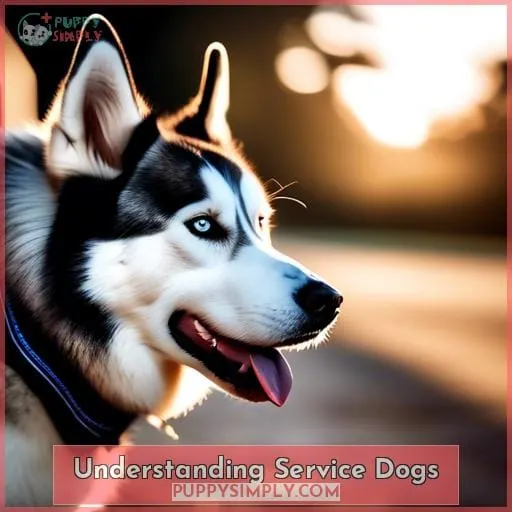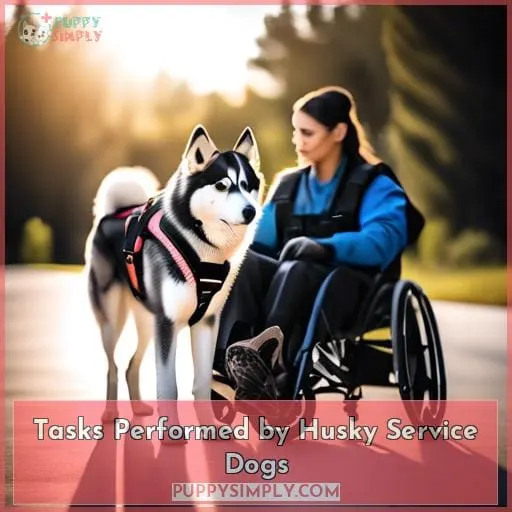This site is supported by our readers. We may earn a commission, at no cost to you, if you purchase through links.

As you embark on this journey to find your ideal service dog, you may overlook the Siberian husky, a breed often associated with icy landscapes and adventurous spirits.
However, beneath their striking appearance lies a potential waiting to be unleashed, a potential that could transform them into your trusted partner in service.
Let’s explore the world of huskies as service dogs, uncovering their unique abilities and suitability for this noble role.
Table Of Contents
- Key Takeaways
- Understanding Service Dogs
- Emotional Support Dogs Vs. Psychiatric Service Dogs
- The Husky Breed: an Overview
- Evaluating Huskies as Service Dogs
- Tasks Performed by Husky Service Dogs
- Training a Husky for Service Work
- Huskies as Emotional Support Animals
- How to Get a Husky Service Dog
- Legal Rights and Protections for Service Dogs
- Huskies as Service Dogs: a Balanced View
- Frequently Asked Questions (FAQs)
- Are Huskies suitable for individuals with physical disabilities?
- How do Huskies perform in warmer climates?
- Can Huskies be trained to assist with mobility tasks?
- Are Huskies prone to any specific health conditions that may affect their service work?
- What are the unique challenges of training a Husky to be a service dog?
- Conclusion
Key Takeaways
- Huskies have desirable traits like intelligence, loyalty, and willingness to please, making them potential candidates for service work.
- However, their stubbornness, high energy levels, separation anxiety, and difficulty focusing present challenges in training and handling.
- Early training, socialization, obedience training, and genetic health screening are crucial for a Husky to s쳮d as a service dog.
- While Huskies can provide comfort and support as emotional support animals, they are not recognized as service dogs and do not have public access rights.
Understanding Service Dogs
Let’s begin by defining service dogs and their crucial role in assisting individuals with disabilities.
Service dogs come in various types, each trained to perform specific tasks that cater to their handler’s unique needs.
Definition and Role of Service Dogs
- Service dogs are individually trained animals that assist people with disabilities by performing specific tasks, enhancing their independence and quality of life.
- They undergo rigorous training to master these tasks, ensuring they can assist their handlers effectively and reliably in various situations.
- Service dog certification requires breed suitability, temperament assessment, and owner commitment, emphasizing the importance of a harmonious partnership between the dog and its handler.
Types of Service Dogs
Venturing into the world of service dogs, you’ll encounter a diverse range of roles these canines fulfill, each tailored to specific disabilities and needs.
Guide Dogs:
Navigating the world with vision impairment, these heroes lead their handlers safely through obstacles.
Hearing Dogs:
Serving as auditory assistants, they alert their handlers to sounds like doorbells, alarms, and smoke detectors.
Mobility Assistance Dogs:
Lending a helping paw, they aid individuals with physical disabilities in tasks like opening doors, picking up objects, and providing balance.
Medical Alert Dogs:
Possessing an extraordinary sense, they detect changes in blood sugar levels, impending seizures, and other medical emergencies.
Emotional Support Dogs Vs. Psychiatric Service Dogs
Let’s explore the differences between emotional support dogs and psychiatric service dogs:
- Their unique roles in providing support to individuals with disabilities.
- Their legal rights in public and private spaces.
These distinctions are crucial for understanding the varying levels of support they can provide.
Definition and Role of Emotional Support Dogs
Let’s now explore the differences between emotional support dogs and psychiatric service dogs.
Emotional support dogs offer comfort through their mere presence, providing solace to individuals with disabilities.
On the other hand, psychiatric service dogs undergo rigorous training to perform specific tasks, aiding individuals with mental health conditions in managing their symptoms. These remarkable canines offer invaluable assistance, helping their handlers navigate life’s challenges with greater ease and independence.
| Emotional Support Dogs | Psychiatric Service Dogs |
|---|---|
| Provide comfort and support | Perform specific tasks |
| No formal training required | Extensive training |
| Any breed can be an ESA | Specific breeds suitable for service work |
| Don’t have public access rights | Have public access rights |
| ESA certifications aren’t regulated | PSD certifications are issued by licensed professionals |
Definition and Role of Psychiatric Service Dogs
In contrast to emotional support dogs, psychiatric service dogs are specially trained to execute specific tasks that mitigate your mental disability.
They’re your lifeline, offering independence and a sense of safety.
They accompany you everywhere, providing comfort and support during challenging moments.
Their unwavering loyalty and keen intelligence make them invaluable partners in your journey toward well-being.
The Husky Breed: an Overview
Let’s take a moment to explore the husky breed in more depth, examining their inherent qualities and potential for service work.
Huskies possess a unique blend of intelligence, loyalty, and endurance, making them intriguing candidates for various service roles.
Yet, they also have independent streaks and high energy levels, presenting potential challenges in training and handling.
Characteristics of Huskies
Huskies’ characteristics, their suitability for working roles, and their unique traits make them either ideal or challenging for service work.
Huskies, known for their intelligence, loyalty, and energetic nature, possess inherent qualities that make them potential candidates for service work.
Their independence and focus allow them to concentrate on tasks, while their eagerness to please and trainability make them responsive to commands.
However, their high energy levels and potential stubbornness require patient and specialized training to channel their energy effectively.
Huskies in Working Roles
The Siberian Husky’s inherent qualities make it a capable working dog, often excelling in roles like search and rescue, sledding, and herding.
Their devoted nature, coupled with their impressive endurance, strength, and intelligence, makes them invaluable partners in these demanding fields.
However, their independent spirit and grooming needs demand experienced owners who can provide ample exercise, mental stimulation, and regular grooming to keep them happy and healthy.
Evaluating Huskies as Service Dogs
Let’s start by assessing the pros and cons of choosing a Husky as a service dog.
Huskies possess several desirable traits, including intelligence, loyalty, and a strong work ethic.
However, their independent nature and potential for stubbornness may pose challenges in training and handling.
Pros of Huskies as Service Dogs
When evaluating Huskies as service dogs, you’ll find they possess several strengths:
- Intelligence
- Loyalty
- Eagerness to please
Their genetic health screening ensures they’re free from common ailments.
Stubbornness management and ample outdoor activity can channel their independent nature and energy.
In cold climates, their adaptability and size make them resilient partners.
Cons of Huskies as Service Dogs
Huskies’ stubbornness, high energy levels, and separation anxiety pose challenges as service dogs.
Their independent nature may lead to disobedience, while their vocalization and prey drive can be disruptive in public settings.
Their difficulty focusing may hinder their ability to perform tasks reliably, and their separation anxiety can cause distress when left alone.
These challenges highlight the importance of careful evaluation, genetic health testing, and specialized training to ensure a husky’s suitability as a service dog.
Tasks Performed by Husky Service Dogs
As a service dog, Huskies can perform various tasks to aid their human partners.
They’re capable of:
- Search and rescue
- Guiding visually impaired individuals
- Providing psychiatric support
With the right training, Huskies can excel in certain tasks while being less suited for others, depending on their temperament and abilities.
Search and Rescue
With their exceptional tracking abilities and unwavering determination, a Husky service dog can be your reliable partner in search and rescue operations.
Their keen sense of smell and tireless work ethic make them invaluable in locating missing persons, detecting scents, and navigating challenging terrains.
As a devoted companion, your Husky will stand by your side, offering unwavering support and assistance in times of crisis.
Guiding Individuals With Visual Impairment
Guiding individuals with visual impairment, Husky service dogs empower them to navigate their surroundings confidently.
Their innate intelligence and eagerness to please make them responsive to training, enabling them to master advanced commands and complex routes.
With their calm temperament and strong bond with their owners, Huskies provide not only mobility assistance but also emotional support, fostering a sense of independence and companionship.
Providing Psychiatric Support
- You’ll find Huskies can provide psychiatric support:
- Detecting shifts in your mood
- Calming you down
- Reminding you to take medication
Their empathy and trainability make them excellent companions for those with mental health conditions.
Huskies can be trained to respond to specific cues, such as hand signals or verbal commands, to provide support during moments of distress or anxiety.
Training a Husky for Service Work
Training a Husky for service work demands your commitment from an early age.
Their independent nature and strong prey drive pose challenges.
However, with consistent positive reinforcement, socialization, and specialized training, you can help your Husky overcome these obstacles and excel as a service dog.
Importance of Early Training
Starting early, you’ll need to train your Husky to obey commands and perform tasks essential for service work.
Begin socialization with other dogs and people to ensure they develop the temperament suitable for public settings.
Obedience training instills discipline and control, while health screening minimizes health risks.
Early intervention maximizes your Husky’s potential as a reliable service companion.
Challenges and Solutions in Training Huskies
When training huskies for service work, you’ll face challenges like their stubbornness and independence.
With patience and consistency, you can overcome these hurdles.
Behavior Modification:
Use positive reinforcement techniques and behavior modification strategies to shape your husky’s behavior and encourage desired responses.
Socialization Strategies:
Huskies may need extra socialization to become comfortable in various environments and with different people.
Temperament Evaluation:
Before starting training, assess your husky’s temperament to ensure they have the right personality and disposition for service work.
Huskies as Emotional Support Animals
If you’re seeking emotional support, Huskies can provide comfort, reduce stress, and uplift your mood with their gentle presence.
Training a Husky as an emotional support animal involves:
- Socialization
- Obedience commands
- Consistent reinforcement
These steps help them become a supportive companion in your daily life.
Benefits of Huskies as Emotional Support Animals
Harnessing their natural empathy, Huskies offer solace and comfort as emotional support animals, alleviating anxiety and promoting emotional well-being.
Their presence fosters a sense of calm, reducing stress and encouraging relaxation.
Huskies’ eagerness to connect emotionally facilitates attachment building, providing a source of unconditional love and companionship.
Engaging with Huskies through petting, grooming, and play promotes social interaction, enhancing mood and reducing feelings of isolation.
Training Huskies as Emotional Support Animals
To train your Husky as an emotional support animal:
- Teach them basic obedience commands like sit, stay, and come.
- Socialize them in various settings by exposing them to different people, places, and animals.
- Ensure they are well-behaved in public and can maintain focus amidst distractions.
Research local laws and regulations regarding emotional support animals.
How to Get a Husky Service Dog
To get a Husky service dog:
- Consult with a licensed mental health professional to determine your eligibility for a service animal.
- Look for Huskies or Husky mixes at local rescues or find a knowledgeable breeder who does genetic health testing.
- Sign up for training as soon as possible to teach your Husky good behavior and the tasks they’ll need to perform as a service dog.
Consulting With a Mental Health Professional
Consult a licensed mental health professional to determine if you qualify for a psychiatric service dog.
They’ll assess your condition, discuss potential benefits, and write a letter of recommendation if appropriate.
Eligibility Criteria: Mental health diagnosis.
Breed Temperament: Friendly, confident.
Initial Training: Socialization, basic commands.
Obedience Classes: Group, private.
Health Screening: Vaccinations, genetic testing.
This table illustrates the key factors involved in obtaining a Husky service dog.
Finding a Husky or Husky Mix
Finding a suitable Husky or Husky mix to train as a service dog can be a challenging yet rewarding endeavor.
Begin your search by reaching out to local Husky rescue organizations.
If opting for a breeder, ensure they conduct comprehensive genetic health testing.
Early training is crucial, so start as soon as possible.
Huskies pose unique training challenges, but with patience and dedication, they can become exceptional service companions.
Training Your Husky Service Dog
After acquiring your Husky or Husky mix, embark on the crucial journey of training it to become your dedicated service dog.
Employ training styles that resonate with your Husky’s unique personality, using positive reinforcement to shape desired behaviors.
Prioritize obedience commands, ensuring your Husky responds promptly and reliably.
Foster an unbreakable bond through bonding techniques, building trust and strengthening the human-canine connection.
Engage in socialization exercises, exposing your Husky to various environments and situations, preparing it for the demands of service work.
Legal Rights and Protections for Service Dogs
As a service dog handler, you’re granted specific legal rights and protections.
In public, your Husky can accompany you to most places.
At home, you can reside in housing that normally wouldn’t allow pets.
These rights ensure your Husky can be by your side, providing invaluable support and assistance.
Public Access Rights
Under the Americans with Disabilities Act, you’re legally entitled to access public places with your service dog.
They’re permitted in restaurants, stores, and even airplanes, as long as they’re leashed and under control.
This right extends to all service dogs, regardless of breed or disability.
| Public Place Rights | Private Place Rights |
|---|---|
| Restaurants | Doctor’s offices |
| Stores | Schools |
| Airplanes | Workplaces |
| Buses | Taxis |
Housing Rights
In tandem with public access rights, housing rights also safeguard your service dog as a vital part of your living situation.
You won’t have to worry about housing restrictions or breed discrimination when you’re accompanied by your furry companion.
The law ensures that public accommodation, including housing, can’t deny you and your service dog entry or impose pet policies that would otherwise exclude them.
This legal protection ensures your service dog’s presence in your home, fostering a stable and supportive living environment.
Huskies as Service Dogs: a Balanced View
Despite the legal protections and public access rights granted to service dogs, you should still consider huskies’ unique characteristics and your own individual needs before deciding if they’re the right fit for you.
Genetic Trait Suitability:
- Not all huskies are cut out to be service dogs.
- Some may have genetic traits that make them more prone to certain behaviors, such as stubbornness or high energy levels, which can be challenging to manage in a service dog role.
Puppy Training Methods:
- Huskies require early and consistent training to learn the skills and behaviors necessary for service work.
- You’ll need to invest significant time and effort into training your husky puppy, and you may need to seek the help of a professional trainer.
Public Behavior Expectations:
- Huskies are often independent and high-spirited, which can make it difficult for them to maintain the calm and focused behavior expected of service dogs in public settings.
- You’ll need to work with your husky to ensure they can behave appropriately in various environments.
Frequently Asked Questions (FAQs)
Are Huskies suitable for individuals with physical disabilities?
Huskies aren’t inherently suited for individuals with physical disabilities.
Their high energy levels and independent nature make them challenging to train for tasks like mobility assistance.
Consider other breeds better suited for this role.
How do Huskies perform in warmer climates?
In warmer climates, Huskies resemble wilting flowers,
struggling to endure the scorching sun,
panting heavily,
their vibrant spirit fading like melting snow.
Can Huskies be trained to assist with mobility tasks?
While Huskies excel at tasks like search and rescue,
their independent nature may hinder their ability to assist with mobility tasks.
Consider breeds specifically suited for such roles.
Are Huskies prone to any specific health conditions that may affect their service work?
Huskies, like the brave explorers of the snow, may face hip dysplasia and eye issues, affecting their service longevity.
Regular checkups are crucial for their well-being.
What are the unique challenges of training a Husky to be a service dog?
Training Huskies as service dogs poses unique challenges:
Stubbornness, independent nature, and high energy levels.
Patience, consistency, and specialized training methods are essential for success.
Conclusion
Unveiling the truth, huskies can indeed excel as service dogs, offering unwavering loyalty and invaluable assistance.
Their unique blend of intelligence, empathy, and athleticism makes them adaptable partners for various tasks.
While training a husky for service work requires dedication and patience, the rewards are immeasurable.
If you seek a devoted companion to navigate life’s challenges, a husky may be your ideal service dog, enriching your life with unwavering support and boundless love.
















